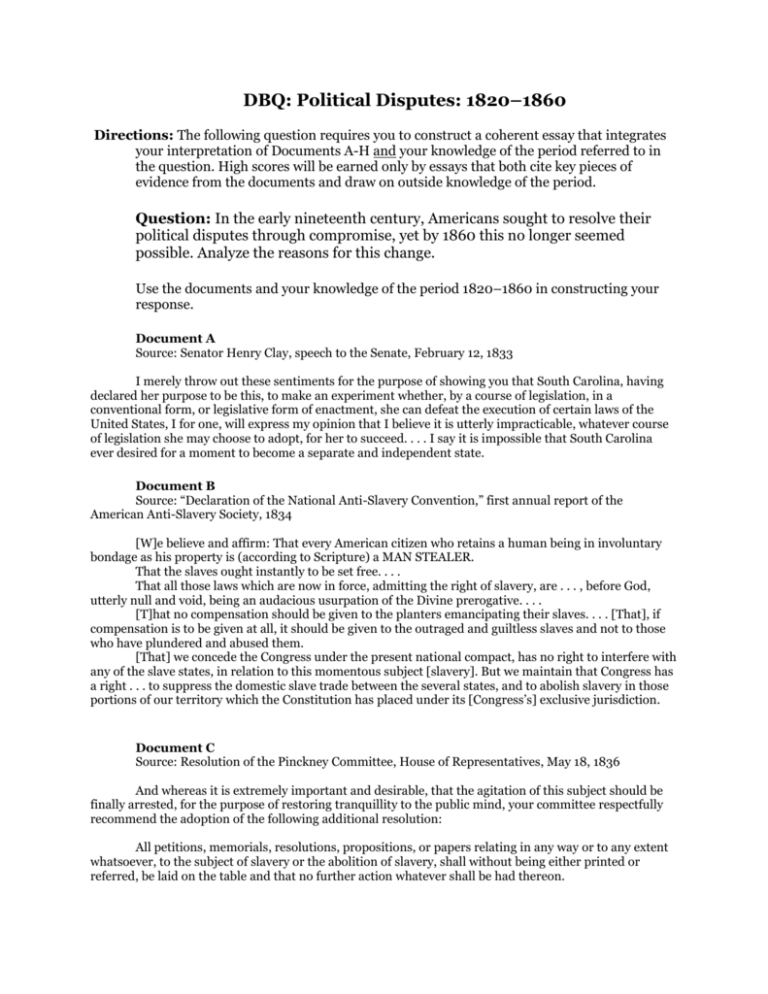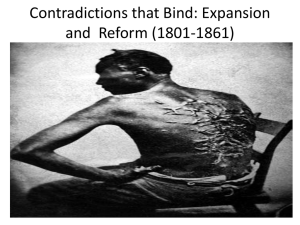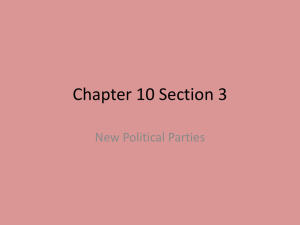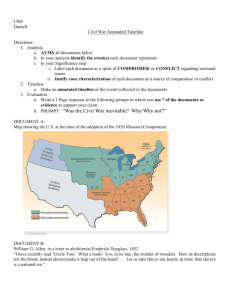AP 2005 u.s. history form b free
advertisement

DBQ: Political Disputes: 1820–1860 Directions: The following question requires you to construct a coherent essay that integrates your interpretation of Documents A-H and your knowledge of the period referred to in the question. High scores will be earned only by essays that both cite key pieces of evidence from the documents and draw on outside knowledge of the period. Question: In the early nineteenth century, Americans sought to resolve their political disputes through compromise, yet by 1860 this no longer seemed possible. Analyze the reasons for this change. Use the documents and your knowledge of the period 1820–1860 in constructing your response. Document A Source: Senator Henry Clay, speech to the Senate, February 12, 1833 I merely throw out these sentiments for the purpose of showing you that South Carolina, having declared her purpose to be this, to make an experiment whether, by a course of legislation, in a conventional form, or legislative form of enactment, she can defeat the execution of certain laws of the United States, I for one, will express my opinion that I believe it is utterly impracticable, whatever course of legislation she may choose to adopt, for her to succeed. . . . I say it is impossible that South Carolina ever desired for a moment to become a separate and independent state. Document B Source: “Declaration of the National Anti-Slavery Convention,” first annual report of the American Anti-Slavery Society, 1834 [W]e believe and affirm: That every American citizen who retains a human being in involuntary bondage as his property is (according to Scripture) a MAN STEALER. That the slaves ought instantly to be set free. . . . That all those laws which are now in force, admitting the right of slavery, are . . . , before God, utterly null and void, being an audacious usurpation of the Divine prerogative. . . . [T]hat no compensation should be given to the planters emancipating their slaves. . . . [That], if compensation is to be given at all, it should be given to the outraged and guiltless slaves and not to those who have plundered and abused them. [That] we concede the Congress under the present national compact, has no right to interfere with any of the slave states, in relation to this momentous subject [slavery]. But we maintain that Congress has a right . . . to suppress the domestic slave trade between the several states, and to abolish slavery in those portions of our territory which the Constitution has placed under its [Congress’s] exclusive jurisdiction. Document C Source: Resolution of the Pinckney Committee, House of Representatives, May 18, 1836 And whereas it is extremely important and desirable, that the agitation of this subject should be finally arrested, for the purpose of restoring tranquillity to the public mind, your committee respectfully recommend the adoption of the following additional resolution: All petitions, memorials, resolutions, propositions, or papers relating in any way or to any extent whatsoever, to the subject of slavery or the abolition of slavery, shall without being either printed or referred, be laid on the table and that no further action whatever shall be had thereon. Document D Source: Senator Daniel Webster, speech to the Senate, March 7, 1850 Mr. President, I wish to speak today, not as a Northern man, but as an American. . . . I will state . . . one complaint of the South . . . that there has been found at the North, among individuals and among the legislatures of the North, a disinclination to perform fully their constitutional duties in regard to the return of persons bound to service who have escaped into the free states. In that respect, it is my judgment that the South is right and the North is wrong. . . . I hear with pain and anguish the word “secession,” especially when it falls from the lips of those who are emminnently [ sic] patriotic, and known to the country, and known all over the world for their political services. Secession! Peaceable secession! Sir, your eyes and mine are never destined to see that miracle. . . . I hold the idea of a separation of these states—those that are free to form one government and those that are slaveholding to form another—as a moral impossibility. We could not separate the states by any such line if we were to draw it. We could not sit down here today and draw a line of separation that would satisfy any five men in the country. Document E Source: Illustration by J.L. Magee, 1856; The New York Public Library, Astor, Lenox and Tilden Foundations Document F Source: Muscogee, Georgia, Herald, quoted in the New York Tribune, September 10, 1856 Free society! We sicken at the name. What is it but a conglomeration of greasy mechanics, filthy operatives, small-fisted farmers, and moon-struck theorists? All northern, and especially the New England, states are devoid of society fitted for well-bred southern gentlemen. The prevailing class one meets with is that of mechanics struggling to be genteel, and small farmers who do their own drudgery, and yet are hardly fit for association with a southern gentleman’s body servant. Document G Source: Abraham Lincoln, speech at Alton, Illinois, October 15, 1858 You may say . . . that all of this difficulty in regard to the institution of slavery is the mere agitation of office seekers and ambitious Northern politicians. . . . But is it true that all of the difficulty and agitation we have in regard to this institution of slavery springs from office seeking—from the mere ambition of politicians? . . . How many times have we had danger from this question? . . . [D]oes not this question make a disturbance outside of political circles? Does it not enter into the churches and rend them asunder? . . . Is it not this same mighty, deepseated power that somehow operates on the minds of men, exciting and stirring them up in every avenue of society—in politics, in religion, in literature, in morals, in all manifold relations in life? Is this the work of politicians? Document H DBQ: Political Disputes: 1820–1860 Directions: The following question requires you to construct a coherent essay that integrates your interpretation of Documents A-H and your knowledge of the period referred to in the question. High scores will be earned only by essays that both cite key pieces of evidence from the documents and draw on outside knowledge of the period. Question: In the early nineteenth century, Americans sought to resolve their political disputes through compromise, yet by 1860 this no longer seemed possible. Analyze the reasons for this change. Use the documents and your knowledge of the period 1820–1860 in constructing your response. The 20–25 Essay • Contains a well-developed thesis that analyzes the issues that confronted the American people in the antebellum era and the attempts at compromise. • Offers an analysis of why those efforts succeeded or failed. • Effectively uses a substantial number of documents. • Supports the thesis with substantial and relevant outside information. • Is clearly organized and well written. • May contain minor errors. The 13–19 Essay • Contains a thesis that analyzes the issues and presents some attempts at compromise. • Offers a limited analysis of why those efforts succeeded or failed. • Effectively uses some documents. • Supports the thesis with some relevant outside information. • Demonstrates acceptable organization and writing. • May have errors that do not seriously detract from the essay’s quality. The 7–12 Essay • Contains a limited or undeveloped thesis. • Deals with the question in a general manner; has a simplistic treatment of the topic; or addresses the issue of compromise in a limited way in terms of either chronology or topical focus. • Merely refers to, quotes, or briefly cites the documents. • Contains little or no outside information. • Demonstrates weak organization and writing. • May have major errors. The 6–Below Essay • Contains no thesis or a thesis that does not address the question. • Exhibits inadequate or incorrect understanding of the question. • Has little or no understanding of the documents or ignores them. • Is poorly written—inhibits comprehension of the essay. • Has numerous errors. Document Information and Inferences Document A: Henry Clay, speech to the Senate, February 12, 1833 • Says it is “impracticable” for South Carolina to nullify a federal law successfully. • Says that South Carolina does not intend to secede from the Union. Document B: Annual report of the American Anti-Slavery Society, 1834 • Condemns slave owners as “man stealers.” • Demands immediate and uncompensated emancipation. • Asserts that laws endorsing slavery are contrary to God’s law and therefore invalid. • Admits Congress cannot interfere with slavery in the states but can end the interstate slave trade and slavery in the territories. Document C: Resolution of Pinckney Committee, House of Representatives, May 18, 1836 • “Gag rule” immediately tables antislavery petitions in the House of Representatives. Document D: Daniel Webster, speech to the Senate Speech, March 7, 1850 • Speaks as an “American” (nationalist) not a sectional representative. • Admits that the North has not complied with the Fugitive Slave Law; they should! • Strongly opposed to secession—“a moral impossibility.” Document E: “Southern Chivalry” • Drawing of the caning of Sen. Charles Sumner (Massachusetts) by Rep. Preston Brooks (South Carolina) in the Senate in May 1856 (note “Kansas” document in his hand). • Sympathetic to Sumner (showing prostrate and bleeding); men laughing in background. Document F: Muscogee, Georgia, Herald, quoted in the New York Tribune, September 10, 1856 • Verbal attack on the ill-bred, ill-mannered working classes and small farmers of the North in comparison to the gentlemen of the South. • Northerners are “hardly fit” for association with their southern compatriots. Document G: Abraham Lincoln, speech at Alton, Illinois, October 15, 1858 • Rejects often made argument that slavery agitation is just the product of ambitious politicians. • Argues that slavery goes beyond politics—impacts religion, literature, and morals to excite and divide the society. Document H: Map of the Presidential Election of 1860 • Lincoln/Republican win all the “free” states except New Jersey—have an electoral majority (180) but only a plurality of the popular vote. • Democrats divided: Stephen Douglas wins only in Missouri/New Jersey (12 electoral). John Breckinridge wins Deep South (72 electoral votes). • Constitutional Union Party (John Bell) wins upper South (39 electoral votes). Outside Information Missouri Compromise, 1819–1821 The Issue: Extension of slavery into the western territories Compromise/Resolution: • Louisiana Purchase divided by 36°30' line • Missouri as a slave state; Maine as a free state Related Information: • Tallmadge amendment to free slaves at age 25 does not pass • Henry Clay, Speaker of the House, as engineer • Jefferson views the compromise negatively; “a firebell in the night” • Second Great Awakening Tariff/Nullification Controversy, 1828–1833 The Issues: • High tariff levels threaten southern cotton exports • Can the federal government legally impose protective tariffs? Compromise/Resolution: Tariff of 1832 reduced over a period of 10 years by a new tariff in 1833 Related Information: • “Tariff of Abominations,” 1828 (45%–50% rates) • John C. Calhoun, South Carolina Exposition and Protest, 1828 (advocates nullification) • Andrew Jackson’s modified Tariff of 1832 (33% rates) • South Carolina nullifies tariff—November 1832 • Jackson threatens South Carolina—passage of Force Bill, March 1833 • Clay engineers Compromise Tariff of March 1833 (reduce rates to 20% by 1842) Antislavery Debate in Congress, 1836–1844 The Issue: Can/should Congress legislate matters related to slavery and its abolition? Compromise/Resolution: Passage (yearly) of “gag rules” that immediately tabled petitions presented by Congressmen that related to slavery Related Information: • Rise of abolition societies to champion antislavery • William Lloyd Garrison/ Liberator • Southern control of Congress and the White House • Liberty Party • Positive defense of slavery Compromise of 1850, 1846–1850 The Issues: • What should the slave status be of lands gained from the Mexican War? • What should be done to enforce the Fugitive Slave Law? • Should slaves be traded publicly in Washington, D.C.? Compromise/Resolution: • California admitted as a free state; New Mexico and Utah territories with popular sovereignty • A new and stronger Fugitive Slave Law passed • The public slave trade in Washington, D.C., would cease Outside Information Related Information: • Mexican War (land gains in Southwest and California) • Wilmot Proviso (free soil) • Popular sovereignty • Calhoun’s “joint and common property” doctrine • Election of 1848 (Taylor victory, rise of Free Soil Party) • Henry Clay/Stephen A. Douglas/John C. Calhoun • Harriet B. Stowe, Uncle Tom’s Cabin (1852) Slavery in the Kansas–Nebraska territories, 1854–1858 The Issue: Should slavery, prohibited by the Missouri Compromise, be extended into the Kansas and Nebraska territories? Compromise/Resolution: “Lecompton Constitution” referred back to the voters of Kansas (English Bill, 1858) by Congress where it is overwhelmingly rejected Related Information: • Southern need for expansion of slavery into the territories/added slave states • Stephen A. Douglas/formation of territories under popular sovereignty • Repeal of the Missouri Compromise • “Bleeding Kansas”/John Brown • “Crime Against Kansas” speech by Charles Sumner • Rise of the sectional, free soil Republican Party • Election of 1856/James Buchanan victory • Proslavery “Lecompton Constitution” passed by Kansas legislature/Dred Scott • Congress refers the document back to Kansas voters (English Bill) • John Brown’s Raid at Harper’s Ferry Election of 1860, 1860–1861 The Issue: Can the Union be preserved if a sectional antislavery party emerges victorious? Compromise/Resolution: Efforts made after Lincoln’s victory to hold the Union together— Crittenden Compromise (extend the 36°30' line to the California border) rejected by Lincoln and Republicans. Related Information: • Increased southern sense of alienation; economic and cultural superiority • Impending Crisis • Threat posed by the Republicans to slavery • Splintering of the Democratic Party in 1860 • Abraham Lincoln’s nomination as a moderate Republican








